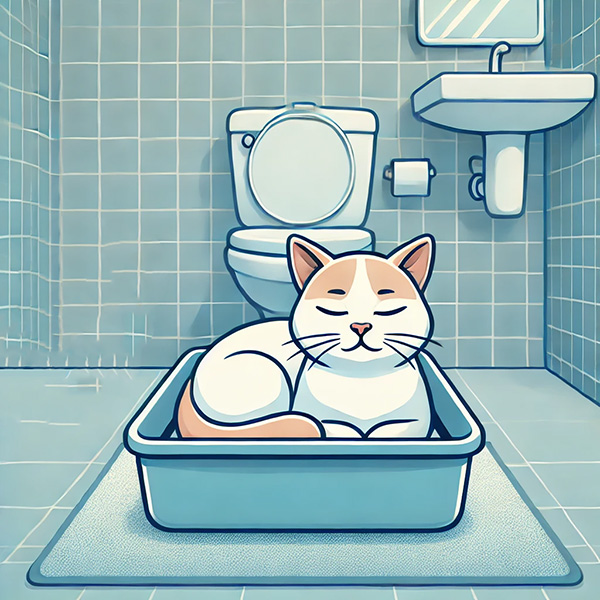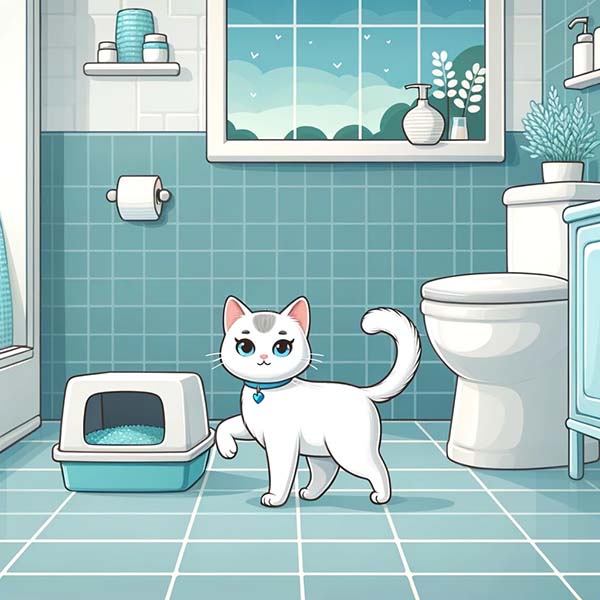Finding your cat playing in their litter box can be confusing and occasionally worrying for pet owners. While it may seem like a quirky or harmless behavior, there are various reasons why your feline friend might find their litter box an appealing place to spend time. From seeking entertainment to expressing natural instincts or even indicating health issues, understanding the motives behind this behavior is crucial. Understanding why cats play in a litter box and ensuring pet owners address any underlying issues effectively, enhancing their pet’s well-being, and maintaining a clean, healthy environment for everyone at home.
7 Common Reasons for A Cat Play In Litter Box
Boredom and Playfulness

When your feline friends start spending more time in their litter tray, turning it into a playground, it could very well be a sign of boredom and playfulness. Cats, especially younger ones or particularly active ones, require mental and physical stimulation. If these needs aren't met, they may turn to the nearest source of potential entertainment—which can sometimes include their litter box.
To determine if boredom is the cause, observe whether the playful behavior in the litter box coincides with a lack of other stimulating activities or toys. Signs such as digging, batting at litter clumps, or even lounging in the litter tray can indicate that your cat is trying to amuse themselves.
Addressing this involves enriching your cat’s environment to divert their attention away from the litter box. Introduce a variety of toys, such as puzzle feeders, balls, or interactive toys that mimic prey-like movements. Regular playtime sessions are crucial; engaging your cat in activities like chasing a laser pointer or feather wand can significantly alleviate their boredom. Ensuring your cat has enough play and interaction will redirect their energy away from the litter box and foster a happier, more content pet.
Territorial Behavior

Cats are deeply territorial creatures, and their behavior in the litter box can sometimes reflect this aspect of their nature. If one of your cats spends a lot of time in their litter box—especially if they scratch excessively around the area, mark with urine more frequently, or even guard the litter box from other cats—it might display territorial behavior. This is particularly common in households with multiple cats or when a new pet or family member has been introduced into the home.
To manage territorial behavior in the litter box, make sure each cat in your household has their own litter box, with an additional one for good measure. This reduces competition and stress around this crucial resource. Position the litter boxes in quiet, separate locations to provide each cat with their own designated space. Additionally, consider environmental enrichment techniques to reduce overall stress, such as pheromone diffusers that can help calm your pets. Regularly cleaning the litter boxes can also prevent the build-up of scents that may trigger territorial responses. By managing their environment carefully, you can help mitigate territorial behaviors and ensure a peaceful coexistence in your home.
Health-Related Issues
When your cat's litter box behavior changes, it might not just be a quirky new habit; it could signal an underlying health issue. Cats frequently use changes in their litter box behavior to signal discomfort or pain. If your cat is spending more time than usual in its litter box, especially if it seems to be straining, making frequent visits, or showing signs of pain while urinating, these could be red flags indicating health problems.
Common health-related issues associated with unusual litter box behavior include urinary tract infections (UTIs), bladder stones, or even more chronic conditions like kidney disease or diabetes. Cats suffering from UTIs may use the litter box more often due to discomfort. Similarly, those with kidney disease might also show increased thirst and, thus, more frequent urination, leading to more time spent in the litter box.
To address these potential health issues, closely monitor any additional symptoms like changes in appetite, vomiting, unusual stool, or lethargy, and consult your veterinarian promptly. Early veterinary assessment can lead to quicker diagnosis and treatment, which might include antibiotics for infections, dietary changes, or more specific treatments depending on the diagnosis.
Observing your cat’s litter box habits, maintaining a clean and stress-free litter environment, and ensuring regular health check-ups are essential steps in catching and addressing health issues early and keeping your furry friend healthy and comfortable.
Stress and Anxiety

Stress and anxiety are significant factors that can influence unusual behaviors in cats, including their activities in the litter box, cat laying, or even sleeping in their litter box. Cats may retreat to their litter boxes as a way to find security and comfort during stressful periods. Signs that your cat's litter box habits are driven by stress or anxiety include more frequent digging, excessive covering of waste, or even using the litter box as a sleeping area.
To address these issues, first identify potential stressors in your cat's environment. This could be changes in the household like new pets, new people, or even rearrangement of furniture. Minimizing these stressors can help alleviate your cat's anxiety. Creating a safe, peaceful space for your cat away from the busier parts of the house can also provide comfort. Regular play sessions and establishing a routine can additionally help reduce anxiety by offering stability.
If behaviors persist, consulting with a veterinarian or a feline behaviorist might be necessary to develop a more personalized strategy to help your cat feel more secure and less anxious.
Something Wrong With The Cat Litter

Cats are highly sensitive to their environments, especially their litter boxes, and any discomfort associated with the cat litter can lead to unusual behavior, such as playing or spending excessive time in the box. If your cat suddenly begins to dig more vigorously or attempts to avoid stepping on the litter, it could be a sign that something is wrong with the litter itself. This could be due to a change in the type of litter used, an aversion to a new scent or texture, or discomfort caused by larger or sharper litter particles.
First, to address issues with the type of cat litter, ensure that you are using a type specifically suited to feline preferences—typically unscented, fine-grained litters that mimic the softness of natural sand. Avoid using scented litters or those with deodorants that can be off-putting to cats.
If you have recently switched litters, consider gradually mixing the new litter with the old to help your cat adjust. Regularly cleaning and maintaining the litter box is also crucial; a clean, odor-free box is more inviting and comfortable for your cat. If problems continue despite these adjustments, trying out various types of litter until you discover one that suits your cat may be necessary.
It’s Their Safe Place
For most cats, the litter box is more than just a place to handle their needs—it's a sanctuary. If you notice your cat spending time in the litter box beyond its usual routine, particularly if they are hiding or sleeping there, it could be a sign they view it as a safe retreat. This behavior is often seen in multi-pet households, rescue cats, or environments that may feel chaotic or threatening to your cat.
To address this, it's important to create multiple safe zones around your home. Provide secluded spots with comfortable bedding, hideaways like cardboard boxes, and even high perches where your cat can observe without being disturbed. Ensuring each cat has its own resources, like food bowls and additional litter boxes, can also reduce stress and prevent one cat from dominating these crucial areas. These measures help your cat feel secure and may reduce their need to retreat to the litter box as a hiding place. Additionally, observing changes in household dynamics that may affect your cat’s behavior is crucial in creating a comfortable environment for them.
Curiosity or Habit

Cats, particularly young kittens, often exhibit a natural curiosity that leads them to explore their surroundings in unique ways, including playing in their litter boxes. This behavior can be part of their early learning process as they discover different textures and elements of their environment. If a cat continues this behavior into adulthood, it might become a habitual action, especially if they have developed a specific fondness for the texture or coolness of the litter.
Identifying whether a cat's litter box play is due to curiosity or habit involves observing its overall interaction with the box. Younger cats typically outgrow this behavior as they mature, but it may have become a comfort habit if an older cat suddenly starts spending more time in its litter box.
To address this behavior, ensure your cat has plenty of other stimulating activities. Engage them with various cat toys, scratching posts, cat trees, and interactive play sessions to divert their attention away from the litter box. Introducing new forms of entertainment can help satisfy their curiosity more appropriately and break the habit of playing in the litter box. If the behavior persists or is accompanied by other unusual signs, consult a veterinarian to rule out any underlying issues.
